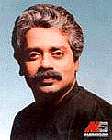 Hariharan took the Indian musical scene by storm in 1996 with his phenomenally successful "Colonial Cousins" album, a collaborative effort with Leslie Lewis. This Indian-English fusion album, which consistently topped the Indian musical charts in 1996 and even became the first Indian act to be featured on MTV Unplugged, won Hariharan the international fame that had eluded him in his more than 15-year career as a recording artiste.
Hariharan took the Indian musical scene by storm in 1996 with his phenomenally successful "Colonial Cousins" album, a collaborative effort with Leslie Lewis. This Indian-English fusion album, which consistently topped the Indian musical charts in 1996 and even became the first Indian act to be featured on MTV Unplugged, won Hariharan the international fame that had eluded him in his more than 15-year career as a recording artiste.
Blessed with a mellifluous voice and impeccable musical skills - Hariharan was trained both in Carnatic and Hindustani music - this Tamilian from Bombay first made his mark in an unconventional way - as a ghazal singer. But his fame was restricted to a small coterie of dedicated ghazal fans. Hariharan has also long sung for Hindi films and for Tamil films since 1993 but, ironically, it was an album in which he has sung in English that catapulted him to the heights of fame.
 Born in 1955, Hariharan grew up in Bombay and has bachelors degrees in science and law. The son of renowned Carnatic vocalists, Shrimati Alamelu and the late H A S Mani, Hariharan naturally inherited his parents' musical talents.
Born in 1955, Hariharan grew up in Bombay and has bachelors degrees in science and law. The son of renowned Carnatic vocalists, Shrimati Alamelu and the late H A S Mani, Hariharan naturally inherited his parents' musical talents.
Mother Alamelu was Hariharan's first guruji. From her he picked up Carnatic music skills. Hariharan's parents were musically open-minded and the young Hariharan was encouraged to listen to Hindustani music. Later, in his teens, inspired by the songs of Mehdi Hassan and Jagjit Singh, Hariharan developed a passion for ghazals and started training in Hindustani music from Ustad Ghulam Mustafa Khan. He used to put in nine hours of singing practice everyday. Hariharan's affinity for ghazals lies in the fact that ghazals offer, in his words, "immense scope for innovation". The committed Hariharan also put heart and soul into learning Urdu when he decided to become a ghazal singer. He has perfected his Urdu diction to such standards that even his audiences in Lucknow, the heartland of the language, have been wowed over.
In 1977 Hariharan bagged the top prize in the All-India Sur Singaar competition and was promptly signed on by the late music director Jaidev to sing for the Hindi film "Gaman". His ghazal "Ajeeb Saane He Mujh Par Qarar" in that movie became such a hit that it won Hariharan an Uttar Pradesh state award, and Hariharan's playback singing career took off.
In his early years Hariharan did the concert circuit and also performed on TV. He has sung for a number of TV serials, e.g., "Junoon". In addition, he cut several successful ghazal albums. He wrote the scores himself for most of these ghazal albums. One of Hariharan's first ghazal albums was "Abshaar-e-Ghazal" with Asha Bhosle, which scored Gold in sales. Another outstanding ghazal album was "Gulfam", which not only hit Double Platinum in sales but also fetched Hariharan the Diva Award for the Best Album of the Year in 1994. (TFM readers should transcend beyond linguistic barriers and listen to their fellow Tamilian's mesmerising voice and superb display of musical skills in these ghazals.) Meanwhile, Hariharan sang in a number of Hindi movies such as "Sahibaan", "Lamhe", "Raam Nagari", "Dard Ka Rishe", Zamana" and "Sindoor".
Hariharan made his debut in the Tamil singing world in 1993 with the patriotic hit song "Thamizha thamizha" in "Roja". Subsequently, Tamil singing assignments began pouring in for Hariharan. Recently, Hariharan was adjudged Best Male Playback Singer in the Tamilnadu State Government Film Awards for 1995. It was his soulful rendition of "Uyireh uyireh" (Bombay) and teasing spirit in "Konjanaal poru thalaivaa" (Aasai) that won Hariharan this honour.
The year 1996 was a milestone in Hariharan's career, when the release of the Indian-English fusion album "Colonial Cousins" skyrocketed him to unprecedented fame. A collaborative effort with Bombay-based composer/singer Leslie Lewis, "Colonial Cousins" became the first Indian act to be featured on MTV Unplugged and also won the pair a string of national and international awards, including the MTV Indian Viewers' Choice award and US Billboards award. In this album, Hariharan has proven his boundless virtuosity. He has also co-written the musical scores for some of the pieces. One very powerful song in the album is "Let me see the love", in which Hariharan scales through Hamsathwani ragam in three octaves, hitting the lowest and highest notes with equal facility and dwarfing Lewis' lead vocals. Another interesting piece is "Feel Alright", in which Hariharan sings the English lyrics in typical Indian country style, complete with gamagams. The other six songs are equally melodious and showcase Hariharan's hitherto little-known versatility.
Hariharan's golden voice has recently graced almost every other new Tamil film released, e.g., "Minsara Kanavu", "Mr Romeo" and "Iruvar". Hariharan has developed a distinctive style of his own even though he admires the late Mohd Rafi and Kishore Kumar as well as S P Balasubramaniam and K J Jesudas. The long-underrated singer has finally arrived and will remain a permanent fixture on the Indian musical scene for some time to come.
Compiled by: Sundram
Sources: published interviews and write-ups; write-ups in CD inlays
LIST OF HARIHARAN'S TAMIL SONGS
Thamizha thamizha - Roja
Kucchi kucchi raakkammaa - Bombay
Uyireh uyireh - Bombay
Nilaa kaaygiradhu - Indra
Konja naal poru thalaivaa - Aasai
Manameh thotta chinnungi - Thotta Chinnungi
Oru thedhi paarthaal - Coimbatore Maapillai
Kannil kannil - Mustafa
Vidukathaiyaa - Muthu
Malargalleh malargalleh - Love Birds
En manadhai kollai aditthavalleh - Kaloori Vaasal
Ucchi mudhal paadham varai - Sengottai
Telephone mani pol - Indian
Udaiyaadha vennilaa - Priyam
Class Roomila - Idhayame Idhayame
Kaloori saalai - Kadhal Desam
Uthatorra Sivappe - Paanchalang Kurichi
Mellisaiye - Mr Romeo
Romeo aattam pottaal - Mr Romeo
Kaadhali kaadhali (2 versions) - Avvai Shanmugi
Taj mahaleh - Periya Thambi
Vennilaveh vennilaveh - Minsaara kanavu
Kannai katti kollaadheh - Iruvar
Poothirukkum vanameh -- Pudhayal
Kaadhal kaadhal -- Aravindan
Oru mani aditthaal - Kaalamelaam Kadhal Vaazhga
Paapa paapa - Mannava
Indhumahaa samuthirameh - Mannava
Nagumo hei.. sugamo - Arunachalam
Yaaroh azhaitthadhu pola - Sishya
Thikuthikuraa - Sishya
Konjum manjal pookal - Ullaasam
? - VIP
? - Suriya vamsam
Aval varuvaalaa - Nerukku ner
Engenge - Nerukku ner
LIST OF HARIHARAN'S GHAZAL AND POP ALBUMS
Sukoon
Aab Shaar-e-Ghazal (with Asha Bhosle)
Ghazals by Hariharan
Hariharan in concert
My Favourite Hits
Dil Ki Baath
Horizon
Reflections
Paigam
Ghazal ka Mausam
Hazir (with Ustad Zakir Hussein on tabla)
Gulfam
Qaraar
Colonial Cousins (with Leslie Lewis)
Halka Nasha
HINDI FILMS IN WHICH HARIHARAN HAS SUNG
Gaman
Sahibaan
Lamhe
Raam Nagari
Khadi Ki Do Haat
Dard Ka Rishe
Zamana
Sindoor
Darr
Rangeela
Jallad
Priyanka
Shikar
Khabi Na Kabhi
Mritu Dand
Sapney
Roja
Bombay
Ziddi
Tere mere Sapne
Maachis
Judaai
LINKS TO INTERVIEWS/CHATS WITH AND WRITEUPS ON HARIHARAN